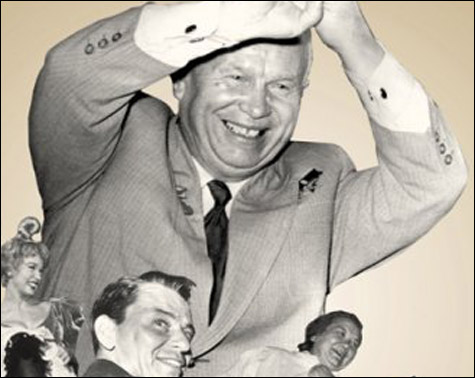
HARPO MARXISM: But Carlson's chronicle goes well beyond being a farcical collection of outrageous stories. |
| K Blows Top: A Cold War Comic Interlude, Starring Nikita Khrushchev, America's Most Unlikely Tourist | By Peter Carlson | PublicAffairs | 344 pages | $26.95 |
America's most famous diplomatic guest was anything but diplomatic. He contradicted and insulted his hosts, provoked a media riot in a California supermarket, manhandled a turkey, fondled a gatecrasher's pot belly, threw a tantrum over a canceled trip to Disneyland, and threatened global annihilation. This stuff writes itself.Former Washington Post reporter Peter Carlson would no doubt agree, and the PR material promoting K Blows Top, his chronicle of Soviet premier Nikita Khrushchev's 1959 visit to the US, promises a non-stop comic romp through Harpo Marxism. There are indeed plenty of absurdities and cheap gags here, but if all you expect is buffoonery and shtick, you'll be pleasantly disappointed.
The book — fast-paced, delightfully sardonic, and thoroughly enjoyable — goes well beyond being a farcical collection of outrageous stories about the gauche behavior of a wacky former Stalinist mass murderer confronting America's high-born and average Joes. Given our hindsight knowledge that Communism fizzled, the very notion that the childish outbursts of an egomaniacal, sleep-deprived dictator were perceived as serious global death threats is laughable. But people weren't laughing so much in 1959.
Our guest was, after all, the main monster in American's post-war nightmares, the powerful madman with his finger on the nuclear-holocaust button. With a light hand, Carlson integrates the backdrop of the repressive 1950s and the grimmer implications — political, economic, diplomatic — lurking behind each snapshot of the Soviet leader's flamboyant travelogue. It's a revealing portrait of a treacherous decade when the media — especially nascent television, whose news departments seldom questioned the views of the government that controlled their broadcast licenses — were almost as innocent as they were influential.
As we look back, it's easy to see that K's comic odyssey was showmanship masquerading as diplomacy, with both sides of the ideological split playing it as a press event — a 10-day photo op with each team scrambling to score points by out-boasting, out-charming, and out-ad-libbing the other. Nelson Rockefeller and Khrushchev trading pulled punches for the cameras in the lobby of the Waldorf-Astoria is just the broadest manifestation of the burlesque.
K Blows Top (the title derives from a New York Daily News headline relating to the dictator's Disneyland meltdown) will find its most appreciative audience among those of us who grew up during the Eisenhower era and are already familiar with the names of the dignitaries, celebs, and pols involved. Carlson, who was born in the early '50s, is a charter member of that cohort, and though he takes pains to annotate the narrative with context and backstories for younger readers, he's telling the story from the perspective of a one-time member of the Cold War's captive audience.
If the book has a fault, it's Carlson's neglect of the idea that Cold War posturing was calculated to manipulate citizens on both sides of the Iron Curtain. The Soviets deflected the allure of materialist prosperity by vilifying the West's exploitation of its have-nots. The US dispelled popular sympathy for capitalism's victims with boogie-man visions of the Red Menace.
Even if he doesn't come right out and say so, Carlson's is a cynic's view of history — one that leaves no question that the rhetorical duel played out across America in 1959 was fueled more by mutual insincerity than by heartfelt ideology.
Now that we think about it, it was kind of funny.
Clif Garboden still has nightmares about Nikita Khrushchev. He can be reached atcgarboden@gmail.com.